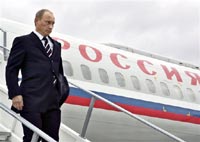Russian President arrives after delay to meet Merkel, discuss Kosovo, Iran's nuclear program
Russian President Vladimir Putin showed up late, but brought flowers for German Chancellor Angela Merkel at a meeting where the two were to deal with tough issues such as more sanctions against Iran over its nuclear program and independence for Kosovo.

Putin showed up more than two hours behind schedule on Sunday night after being delayed by bad weather in Moscow, and got a warm greeting from Merkel at a restaurant in Hattenheim outside Wiesbaden in southwest Germany.
"We are glad that the president is here. It snowed in Moscow and here there are clear starry skies," Merkel said. The two were to address a Russian-German forum in Wiesbaden's historic Kurhaus resort on Monday.
One major topic on the agenda is what Merkel in her Saturday podcast stressed as "the necessity of new sanctions" against Iran - a source of potential friction with Russia, which is skeptical about efforts in the U.N. Security Council to impose a third set of sanctions against Tehran for its refusal to halt its uranium enrichment program.
Putin is then scheduled to head for Iran, which has defied the United States and other governments over the issue. Last week, the Russian leader said he saw no "objective data" proving that Iran is pursuing nuclear weapons.
In Moscow, a Kremlin spokeswoman said on Sunday that Putin has been told of a plot to assassinate him during his visit to Iran this week. The spokeswoman, who spoke on customary condition of anonymity, refused further comment.
Interfax news agency, citing a source in Russia's security services, said suicide terrorists had been trained to carry out the assassination. A spokesman for Iran's Foreign Ministry, Mohammad Ali Hosseini, denied any such plot had been uncovered and he characterized the news as disinformation spread by adversaries hoping to spoil Russian-Iranian relations.
Merkel and Putin held a Russia-European Union summit earlier this year that ended on a sour note after Russian authorities prevented opposition leader Garry Kasparov from traveling to Samara, Russia, for a protest rally near the summit site. Putin said Russia and Europe were partners "like it or not."
The Wiesbaden meeting is rife with potential for similar friction, taking place against the background of the campaign for December parliamentary elections in Russia and speculation about Putin's role in politics after his second presidential term ends next year. His assertive stance toward the West has helped boost his popularity at home.
Merkel must balance needing Russia as a key oil and gas supplier and partner on foreign policy questions such as Iran and Kosovo against European dismay at Russia's human rights record. Russian officials have said they will raise their opposition to U.S. plans to place 10 interceptor missiles in Poland to counter possible missile attacks from Iran.
Russia opposes plans by Western countries to give Kosovo independence from Serbia, its traditional ally. The province, where the population is 90 percent ethnic Albanian, has been under U.N. administration since a 1999 NATO-led air war to end a Serbian crackdown on ethnic Albanian rebels.
Putin's visit to Tehran will be scrutinized for clues to Russia's future course. Moscow has helped Iran avoid tougher sanctions and is building the country's first nuclear reactor. But Russia has hedged its position by delaying completion of the plant, and urging Iran to comply with international controls on its nuclear program.
Six countries - the U.S., Britain, France, Germany, Russia and China - have successfully won two limited rounds of sanctions against Tehran for refusing to stop its effort to make enriched uranium, but efforts toward a tougher round have dragged out amid Chinese and Russian skepticism. Iran says its nuclear program is peaceful; the U.S. maintains that the uranium enrichment program is part of an effort to build nuclear weapons.
Subscribe to Pravda.Ru Telegram channel, Facebook, RSS!


